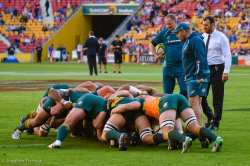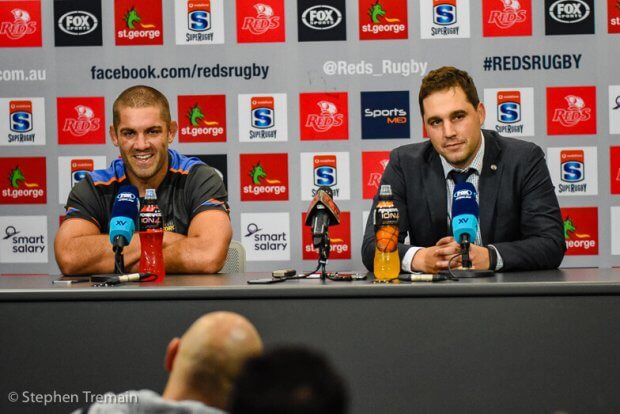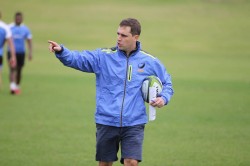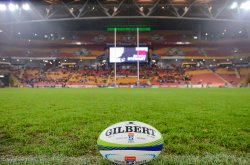Thursday’s Rugby News has some mighty depressing news on the coaching front, more about the Wallabies and fitness at altitude, Roach thriving in the NRC and calls to ban harmful contact from British academics.
[one_half last=”no”]
‘Blood’y hell!
God this piece of news pisses me off. A lot. As if the loss of the Force wasn’t depressing enough, the exodus of the talent looks to make things even worse. As it turns out, one of the most promising rising talents in Australian rugby coaching, Dave ‘Blood’ Wessels, COULD be set to sign with Munster.
According to Irish tabloids, Wessels is expected to be signed as the lead coach for the club following the departure of fellow saffa Rassie Erasmus, who will return to the Rainbow Nation to take on a role as Springboks‘ director of rugby in December. As a result, it is widely expected that Wessels may be officially announced in the coming days as the new coach, and will begin a transitional phase in the coming weeks.
Apparently, IRFU’s performance director David Nucifora confirmed Munster are only talking to one potential candidate, and aren’t far away from confirming that candidate.
“Are we getting close to getting someone? Yes we are,” Nucifora said.
“I’m hopeful we will have an answer to this sooner rather than later so we can engineer a really well-delivered handover between the two coaching groups. You don’t usually get that chance, this is a coordinated approach.
“We’ve spoken to a number of people over the last number of months. We are well advanced at the moment. I’d be hopeful that we’d have news for you in the short-term. Hopefully it would be permanent.”
While a lot of this is still to be confirmed, Erasmus was quick to tout Wessels as his replacement, as the two had worked together at the Stormers.
“I can vouch for his character… and his work ethic,” Erasmus confirmed.
Wessels work this year has been utterly outstanding for the Perth club, with them finishing with as many wins as final conference winners the Brumbies. It’s easy to forget that no one gave Wessels a hope in hell of doing well at the start of this year, and now he is one of the most in demand coaches in the world.
And yet, the Force still got cut. Don’t even get me started on that.
Wessels has been believed to have been linked with the Rebels, and admitted that with the amount of offers being thrown his way, he has found it to be an unbelievable difficult decision. And it is important to remember that, while Munster look to be jumping the gun with announcements, Wessels himself has said no formal decision has been made.
“I’m very flattered that there’s some interest in me from different places,” Wessels said to Fox Sports.
“Just like the players, I want to make a decision with my family.
“I feel very grateful for everyone in Australian rugby who has helped me.
“There’s a huge part of me that want to repay some of their faith in me.
“At the same time, I have ambitions that one day I’d like to be among the best coaches in the world, and at the moment I think I’m quite far from that.”
[/one_half]
[one_half last=”yes”]
Fitness Bynressss

The Wallabies are back at altitude this week, playing 4600 feet above sea level against a Springboks team determined to make amends after their worst ever performance against the All Blacks.
It’s hard to win up there even for some of the best teams in the world, but Mick Byrne has come up with an incredibly foolproof strategy to counteract the effects of altitude: eat some concrete and harden the hell up.
“Obviously, you can’t hide away from the fact that altitude’s a different atmosphere,” Byrne said to rugby.com.au.
“But I think the players, you get used to it pretty quickly and adapt to it pretty quickly.
“The big one is, it’s not at the front of your mind.
“You set your protocols before you come here, you know what you’re doing and then when you get here, you just get on with it.
“It’s not something you talk about, it’s not something you bring top of mind but it’s certainly something you plan before you come here and you just get on with your life.”
Tests at altitude are renowned for their difficulty, particularly as many teams often run out of steam in the closing states. So really, it comes back down to the most spoken about phrase during Cheika’s entire tenure as coach: fitness.
“If you’re fit you’ll be OK. Getting a good base of work, which we did in that August window, has set us up for the year really well,” said Byrne.
“We’re still not there, we’ve still got work to do but what we did in that window and how hard the players worked, we’ve seen some good results.”
“But I also think their levels of fitness have been at a high level and they back themselves in that area.
“We’re in that stage now where we’ve just got to – the mentality is we’ve got to back ourselves and just get on with life
“I know S&C coaches will have a crack at me but it isn’t rocket science.
“They talk about it being science but I didn’t have a lot of sports science around me when I played and we were able to get fit – tt’s about hard work.
“The good thing about it is making sure you’re looking after the loading of the players in-season
“That’s our challenge.
Maintaining fitness and keeping your fitness while playing games through load of training is a management area and I think we’ve got our head around that and we’re doing a good job.”
Expect the Wallaby squad to be announced at some point today.
[/one_half]
[one_half last=”no”]
Ram it Up
Heading over to NRC goss, Hugh Roach has been quick to commend this years edition of the competition, with GAGR favourite Brett McKay having a chat to him for rugby.com.au.
Having been at the Tahs since 2014, Roach is one of the few inaugural players left at the Greater Sydney Rams, who have been looking like the pick of the NSW NRC sides this year. But, according to Brett, he’s enjoying his rugby as much as ever, particularly in his embracing of the competition.
“I’ve always been someone who enjoys hard work,” he says.
“I’ve found that if you enjoy being under the pump and overcoming adversity, it’s easier coming up against hurdles and getting past them.”
“Rugby, at the end of the day, is only a job through the week. Your job is to prepare, study footage of yourself and other teams; that’s your job. But none of us would take a pay cheque on the weekend, we’d all play for free.
“I think if you’re thinking of rugby as a pay cheque, I don’t think I could get anything out of it thinking that way.
“Once I started thinking of it as a process, a step-by-step list of things to get through during the week, then you let the shackles go on the weekend, and it’s time for battle.
“I really enjoy that process. Some people might not enjoy it quite the same way, but that’s just the way I’ve come to look at it.”
The NRC has proven to be a battleground for many Tahs next year, with Roach in a battle with fellow hooker (and Sydney Rays captain) Damien Fitzpatrick for a dominant hooker role next year.
The Fijian Drua currently have a bonus point win lead over second place, but after that the next five teams are separated by just two points on the competition table.
“I think a lot of teams – especially the teams we’ve played – have got a lot to prove,” Roach explained.
“There are a lot of guys playing with chips on their shoulders. They’ve got to lot to prove in the Sydney teams because they’re not franchise teams.
“Then you look at the franchise teams like Perth and Melbourne, they had their tussle throughout the year, and you throw Canberra in there as well, and there’s a lot of guys around on the fringe (of Super Rugby squads) who have a lot to prove.
“It’s anyone’s game on any particular day. We came out really strong against the Eagles, but then didn’t really put out a solid effort against Perth. It’s really up and down each game, and anyone can win on their day, I believe.”
The Rams will take the bye this weekend and will look to gather some much needed recuperation following a great two first weeks followed by two disappointing weeks.
Meanwhile, last round served us up some exciting rugby, as well as some record-breaking crowds on the Saturday. NSW Country Eagles picked up one of their biggest country crowds in NRC history, with well over 2,000 vocal supporters turning out to watch them pip the Canberra Vikings at the death.
However, then the Fijian Drua broke the record for the largest crowd in the competition’s entire history, with over 10,000 coming through the gates in Suva. Many more will probably be back after they made light work of an under-strength Perth Spirit side.
Sunday saw Queensland Country pick up their first ever win against the Rays at Pittwater Rugby Park, while a decent crowd saw the Melbourne Rising home with an upset win over the Rams.
This week sees the Vikings back home against the Drua in Canberra on Friday night, who will find themselves away from home for the next three weeks. Saturday sees Queensland Country look to extend their winning streak to three for the first time ever when they host the Rising at Bond University on the Gold Coast.
Sunday sees what will probably be the match of the round, with the Spirit back at their fortress home ground of McGillivray Oval in Perth taking on Brisbane City. And finally, the round finishes on the Monday of the long weekend down in Goulburn, when the NSW Country Eagles will look to jump up the table when they take on the Sydney Rays.
Get out there and support your NRC rugby, and let’s help to grow the game!
[/one_half]
[one_half last=”yes”]
Ban the Scrum?
Yeah, so here’s an interesting piece of goss out of England.
In an opinion piece published in the British Medical Journal, many academic experts are arguing that scrums and tackling should be removed entirely from the game of rugby, especially for younger kids.
Citing the United Nations Convention on the Rights of the Child, Allyson Pollock and Graham Kirkwood demanded that the “UK government put the interests of the child before the interests of corporate professional rugby unions and remove the tackle and other forms of harmful contact from the school game”.
“Governments have a duty to protect children from risks of injury and to ensure the safety of children,” they added.
The response has drawn a myriad of different opinions, but one of the best against the idea of the ban came from our own Professor Caroline Finch, a director of the Australian Centre for Research into Injury in Sport and Its Prevention at Federation University. In her mind, having physical contact in sport games is important for children to know, learn about and manage.
“There is no doubt there is a higher risk of injury to children and to everyone in sports that have body contact and collisions, and rugby is one of the football codes that does have that,” she said to the Sydney Morning Herald.
“There’s a real danger that children aren’t taught ‘What happens when you’re running along and someone collides with you?’
“Children don’t start playing anything approaching adult rules and contact until after 16,” she added.
On a global state, World Rugby called the report “extreme and alarmist,” while England RFU’s new chief executive, Stephen Brown responded by believing that adequate safety measures are in place.
“I don’t think there was anything new in the report,” said Brown to the UK’s Telegraph.
“It was stuff that had been out there previously. What we are constantly doing is developing how the game is played for young people and making sure that it is safe, that there is appropriate coaching and that people are aware of what they should be doing and what they shouldn’t be doing at this important development stage.
“There is a lot of research going on in this area. We do everything we can to prepare people. But people have choices to be involved in the sport. The sport is a contact sport. Ultimately, the values and quality of our sport far outweigh the risks attached to it. People play our sport because they want to be physically active. They like the values of the sport, its culture and the connection it gives people.
“Last Sunday, Jack, my 6-year-old next-door neighbour, went to his very first mini-rugby training session. I was talking to his mum about it. She was very excited that he was starting rugby, getting connected with rugby. He came back with his new kit, a very excited young man with his certificate saying ‘I’m now a rugby player’ and I thought that was wonderful. It’s important that we make the environment right for people like Jack but also we shouldn’t forget why parents want their kids to play rugby.”
[/one_half]




